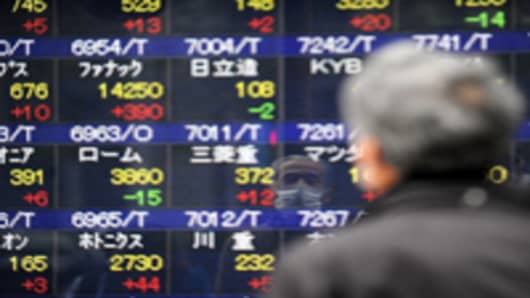Japan's super-bourse got off to a rocky start as investors sent shares of the new group down by more than a tenth in an otherwise rapidly rising market.
Shares of Japan Exchange Group (JPX) were down 12 per cent by mid-afternoon in Tokyo on Friday, on trading volume about 17 times higher than the two-month average. The Nikkei 225 stock average rose more than 2.5 per cent.
Friday was the first opportunity for small brokerages to offload their long-held shares in the Tokyo Stock Exchange, an unlisted company that acquired the listed Osaka Securities Exchange in August. The merged company, renamed Japan Exchange Group, went public via a stock swap, giving former TSE shareholders a chance to realise gains.
The fall leaves JPX's equity valued at Y276bn ($3.23bn), ranking it tenth among global exchange groups just ahead of TMX of Toronto.
The selling pressure on JPX may last for a while, said Hiroshi Torii, an analyst at Deutsche Bank in Tokyo, noting that old shareholders in the TSE now hold 84 per cent of outstanding shares in JPX. Many of them may be looking to cash in holdings they have held for decades, he said, bought at much lower levels.
(Read More: Under Siege, Bank of Japan Awakens to Political Reality)
The sell-off underlines the challenges facing JPX, which was formed as part of a government effort to create a comprehensive exchange handling equities, derivatives and other securities, in order to bolster Tokyo's credentials as a financial hub.
Trading volumes in the world's second-largest stock market have plunged to less than half of their peak in 2007, hit by growing investor aversion to Japanese stocks. Initial public offerings, too, are well down on levels before the global financial crisis despite a recent recovery.
The pressure on smaller, retail-focused brokerages has been particularly acute as individual investors' share of trading has dwindled to about 18 per cent, from more than 50 per cent in the early 1980s.


